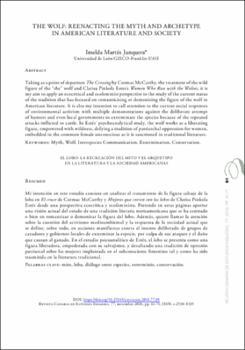The Wolf: Reenacting the Myth and Archetype In American Literature and Society
Author
Martín Junquera, ImeldaDate
2018Abstract
Mi intención en este estudio consiste en analizar el tratamiento de la figura salvaje de la
loba en El cruce de Cormac McCarthy y Mujeres que corren con los lobos de Clarisa Pinkola
Estés desde una perspectiva ecocrítica y ecofeminista. Pretendo en estas páginas aportar
una visión actual del estado de una tradición literaria norteamericana que se ha centrado
o bien en romantizar o demonizar la figura del lobo. Además, quiero llamar la atención
sobre la cuestión del activismo medioambiental y la respuesta de la sociedad actual que
se define, sobre todo, en acciones manifiestas contra el intento deliberado de grupos de
cazadores y gobiernos locales de exterminar la especie, por culpa de sus ataques y el daño
que causan al ganado. En el estudio psicoanalítico de Estés, el lobo se presenta como una
figura liberadora, empoderada con su salvajismo, y desafiando una tradición de opresión
patriarcal sobre las mujeres implantada en el subconsciente femenino tal y como ha sido
trasmitida en la literatura tradicional. Taking as a point of departure The Crossing by Cormac McCarthy, the treatment of the wild
figure of the “she” wolf and Clarisa Pinkola Estes’s Women Who Run with the Wolves, it is
my aim to apply an ecocritical and ecofeminist perspective to the study of the current status
of the tradition that has focused on romanticizing or demonizing the figure of the wolf in
American literature. It is also my intention to call attention to the current social responses
of environmental activism with multiple demonstrations against the deliberate attempt
of hunters and even local governments to exterminate the species because of the repeated
attacks inflicted to cattle. In Estés’ psychoanalytical study, the wolf works as a liberating
figure, empowered with wildness, defying a tradition of patriarchal oppression for women,
embedded in the common female unconscious as it is sanctioned in traditional literature.





